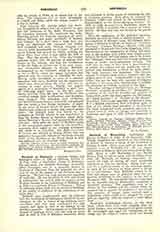

Berthold of Henneberg, Archbishop and Elector of Mainz, b. 1441; d. December 21, 1504. Having completed his education at the University of Erfurt, he became a canon of the Cathedral of Cologne in 1464. Three years later he came to the imperial court of Frederick III. He was chosen Archbishop of Mainz in 1484 and consecrated May 20, 1485. When in 1486 Maximilian I was elected Roman King, to rule in union with his father, Frederick III, Berthold, as imperial chancellor, obtained the right of having all royal documents submitted to him for signature. Being heart and soul for a political reform of the tottering empire, he used all his influence to bring about a change in its constitution. How Berthold wished to reform the empire may be gathered from the program submitted to the emperor at the diet of Worms in 1495. All state affairs were to be managed by an imperial council (Reichsrath) consisting of seventeen members. The councillors were to be chosen by the electors and the estates, while the emperor was to appoint the president of the council. The emperor, of course, justly rejected such a program which would have changed the empire into an oligarchy, with the emperor a mere figurehead.
Berthold‘s ecclesiastical reforms, on the other hand, which were even more pressing than political changes, were accompanied with great success. He encouraged and urged the reformation of the clergy and the religious orders, which was already in progress, and was especially solicitous for a better education of the clergy. He courageously resisted the heretical tendencies of many humanists and, though friendly disposed towards the better ones, scathingly rebuked others. To guard against impure literature he established in his diocese, on January 4, 1486, a censorship of the press, which was the first in history. Berthold had long been dissatisfied with the many pecuniary demands of Rome upon Germany and the improprieties that often accompanied the preaching of indulgences, and shortly before his death he respectfully submitted these grievances of the German nation to Pope Pius III, who had just succeeded Alexander VI. He is buried in the Cathedral of Mainz, where a magnificent monument perpetuates his memory.
MICHAEL OTT

